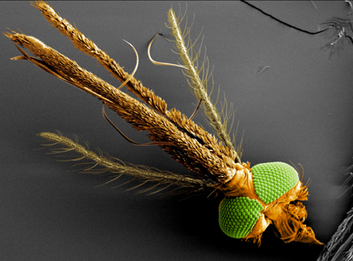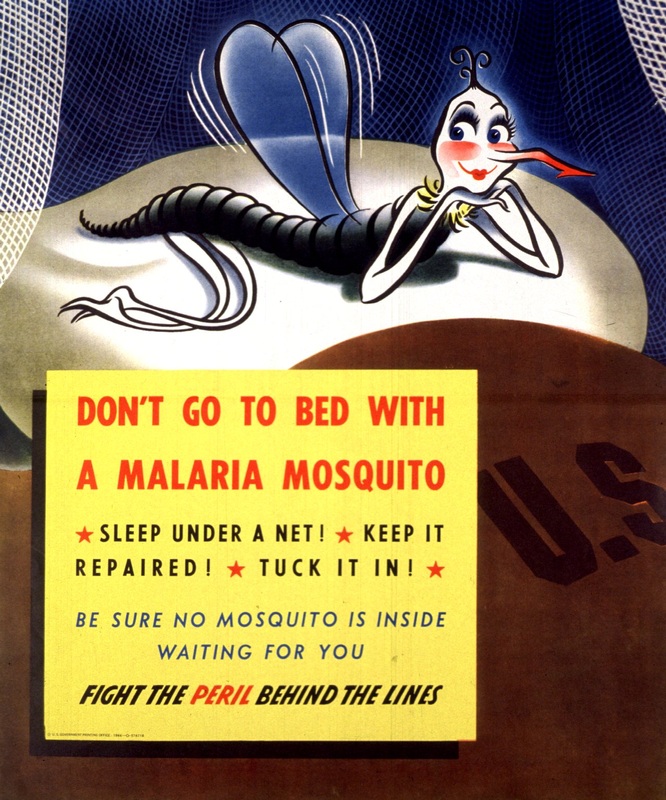 *Image of A. gambiae from Dr. Larry Zwiebel lab, Vanderbilt University
*Image of A. gambiae from Dr. Larry Zwiebel lab, Vanderbilt University Skin bacteria contribute to the mosquitoes' attraction towards humans
In a sense, we all smell different. Every human being has a particular scent that is perceivable among others. Some persons have strong odors while others have more delicate odors, and so forth. However, what is interesting about human scent is that our skin alone, is not capable of emitting any odor, so in theory, we should be odorless (for more information about this topic, follow this link). But the question is, why do we smell? It turns out that there are groups of bacteria that live throughout our bodies, specifically in our skin that produce volatile compounds that give a scent. This mixture of volatile compounds is what we perceive as our body odor, which is particular to specific areas of our body. But do not get alarmed, after all, we are holobionts, which means we live in close interaction with millions of microorganisms from the moment we are born (for more information about the microbes that first colonize our bodies follow this link) until the moment we perish, and more importantly, they are necessary for our survival.
What does any of this have to do with mosquitoes? Well, as a matter of fact, mosquitoes are experts in detecting smell, and it turns out, we produce their favorite smell. Actually, our skin bacteria produce their favorite smell. That is one of the reasons they can easily detect us, no matter where we are. Interestingly enough, there are persons that are more attractive to mosquitoes than others. The reason to this selective attraction lies in the types of microbes that are abundant within your skin microflora. In a recent study, scientists from Wageningen University and Research Centre in the Netherlands discovered that Malaria mosquitoes (Anopheles gambiae) have a differential attraction to volatile blends produced by specific groups of bacteria associated to the skin of humans (Verhulst et al. 2010). In other words, there are specific groups of bacteria in our skin (which, essentially, are part of our normal skin microflora) that produce compounds that are irresistible to mosquitoes. They identified 4 major groups of bacteria that had a huge impact in the mosquitoes attractiveness. Persons that had a great deal of Corynebacterium minutissimum, Brevibacterium epidermidis, Bacillus subtilis, or Staphylococcus epidermidis in their skin were more attractive to mosquitoes while persons that had more Pseudomonas aureginosa, Leptotrichia, and/or Delftia species were less attractive (for more information about these findings, follow this link). So, if you think you are sweet for mosquito bites then it is probable that you have an abundance of one of the 4 groups of bacteria mentioned above.
These findings are of important value for further studies that are involved in eradicating malaria and other diseases transmitted by mosquitoes. Once we understand the interactions between mosquitoes that are vectors of different types of pathogens (i.e. Dengue, Yellow Fever, Malaria), and the way they're are attracted to humans, we can start developing chemicals that attract mosquitoes to traps or ways to repulse the insects from us. At least we are still in the race that aims to eradicate malaria, and it appears we are winning.
*References:
(1) Verhulst, N.O., et al. (2010) Chemical ecology of interactions between human skin microbiota and mosquitoes. FEMS Microbiol Ecol 74: 1–9.
(2) Verhulst, N.O., et al. (2010) Differential attraction of malaria mosquitoes to volatile blends produced by human skin bacteria. PLoS One 5(12): e15829.
(3) Verhulst, N.O., et al. (2011) Composition of human skin microbiota affects attractiveness to malaria mosquitoes. PLoS One 6(12): e28991.
In a sense, we all smell different. Every human being has a particular scent that is perceivable among others. Some persons have strong odors while others have more delicate odors, and so forth. However, what is interesting about human scent is that our skin alone, is not capable of emitting any odor, so in theory, we should be odorless (for more information about this topic, follow this link). But the question is, why do we smell? It turns out that there are groups of bacteria that live throughout our bodies, specifically in our skin that produce volatile compounds that give a scent. This mixture of volatile compounds is what we perceive as our body odor, which is particular to specific areas of our body. But do not get alarmed, after all, we are holobionts, which means we live in close interaction with millions of microorganisms from the moment we are born (for more information about the microbes that first colonize our bodies follow this link) until the moment we perish, and more importantly, they are necessary for our survival.
What does any of this have to do with mosquitoes? Well, as a matter of fact, mosquitoes are experts in detecting smell, and it turns out, we produce their favorite smell. Actually, our skin bacteria produce their favorite smell. That is one of the reasons they can easily detect us, no matter where we are. Interestingly enough, there are persons that are more attractive to mosquitoes than others. The reason to this selective attraction lies in the types of microbes that are abundant within your skin microflora. In a recent study, scientists from Wageningen University and Research Centre in the Netherlands discovered that Malaria mosquitoes (Anopheles gambiae) have a differential attraction to volatile blends produced by specific groups of bacteria associated to the skin of humans (Verhulst et al. 2010). In other words, there are specific groups of bacteria in our skin (which, essentially, are part of our normal skin microflora) that produce compounds that are irresistible to mosquitoes. They identified 4 major groups of bacteria that had a huge impact in the mosquitoes attractiveness. Persons that had a great deal of Corynebacterium minutissimum, Brevibacterium epidermidis, Bacillus subtilis, or Staphylococcus epidermidis in their skin were more attractive to mosquitoes while persons that had more Pseudomonas aureginosa, Leptotrichia, and/or Delftia species were less attractive (for more information about these findings, follow this link). So, if you think you are sweet for mosquito bites then it is probable that you have an abundance of one of the 4 groups of bacteria mentioned above.
These findings are of important value for further studies that are involved in eradicating malaria and other diseases transmitted by mosquitoes. Once we understand the interactions between mosquitoes that are vectors of different types of pathogens (i.e. Dengue, Yellow Fever, Malaria), and the way they're are attracted to humans, we can start developing chemicals that attract mosquitoes to traps or ways to repulse the insects from us. At least we are still in the race that aims to eradicate malaria, and it appears we are winning.
*References:
(1) Verhulst, N.O., et al. (2010) Chemical ecology of interactions between human skin microbiota and mosquitoes. FEMS Microbiol Ecol 74: 1–9.
(2) Verhulst, N.O., et al. (2010) Differential attraction of malaria mosquitoes to volatile blends produced by human skin bacteria. PLoS One 5(12): e15829.
(3) Verhulst, N.O., et al. (2011) Composition of human skin microbiota affects attractiveness to malaria mosquitoes. PLoS One 6(12): e28991.

 RSS Feed
RSS Feed